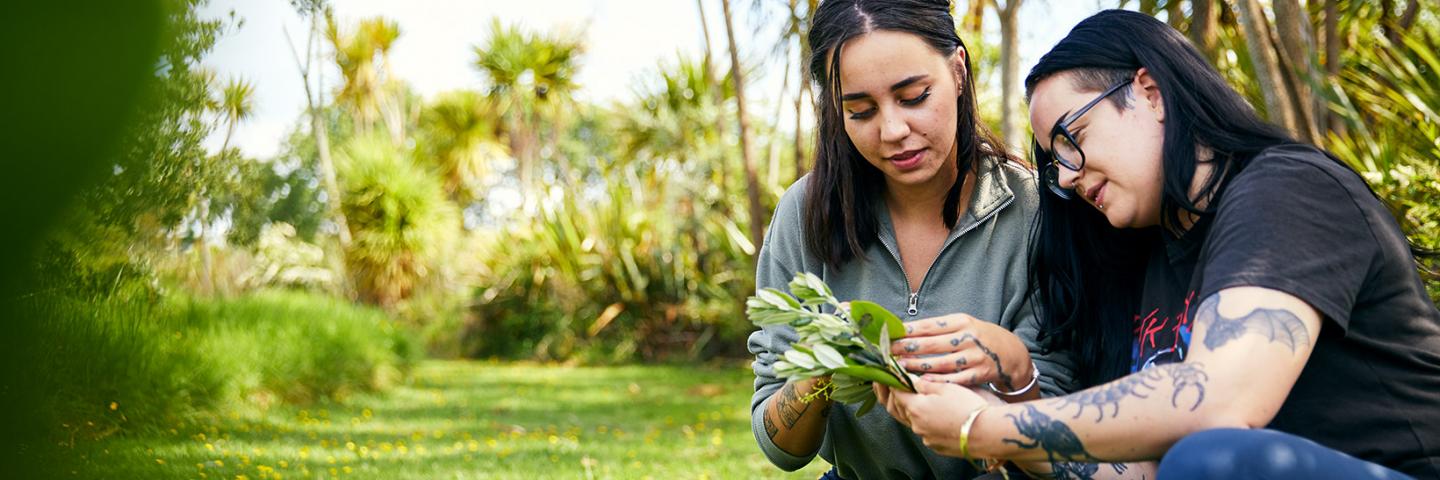Programme overview
The world is changing rapidly. Climate disruption is happening faster than animals, plants, and human communities can adapt – unless we take extraordinary action. To lead the charge, Aotearoa, New Zealand needs biodiversity professionals who think innovatively, take action, and move seamlessly from the lab into the field.
The Master of Applied Science (Biodiversity Management) is a programme of study that will allow you to choose the knowledge and skills you need to develop and advance your career. At completion you will gain high-level analytical and strategic competency and undertake impactful research that contributes directly to your work and the wider industry while working on the ground to refine your practical field-based skills.
When you graduate, you’ll be able to:
- apply advanced technical knowledge and skills – design, conduct and disseminate independent research using recognised industry methodologies, data analysis, and effective problem-solving
- develop and maintain collaborative relationships with mana whenua and a range of stakeholders
- contribute to improved practice and environmental sustainability in business, government, and non-governmental sectors through critical evaluation, new knowledge, insight, and innovation
- apply cross-cultural perspectives, understanding, and engagement with indigenous bodies of knowledge, practices, and worldviews with a critical focus on Te Ao Māori and Te Tiriti o Waitangi in an applied science context
- critically assess the impacts of human activity on the global environment and how environmental management in Aotearoa could address these issues.
Highlights
Earn and learn: This programme is a mix of on-campus learning, and field trips, making it an excellent option for biodiversity professionals who are already working and want to start postgraduate study.
Tap into a national network of experts and industry partners: This master’s programme is supported by scientists and other experts from around Aotearoa, New Zealand, through guest lectures.
Integrating Western perspectives with Mātauranga Māori: Adapting to environmental crises requires collaboration. In Aotearoa, New Zealand, that means working with local Māori iwi and hapu. This master’s programme balances Indigenous knowledge with scientific understanding to help you unlock innovative solutions.
Undertake meaningful research: Choose from a wide range of thesis topics supported by highly qualified supervisors to focus on your area of interest. You might choose to do a workplace project, collaborate with industry, or acquire research funding for a specific project. Completing your thesis is a great chance to push your independent research capabilities, and your thesis and industry advisors will be there to support you.
Focus on partnership and stakeholder engagement: You’ll hone your relationship-building and collaboration skills to work professionally with mana whenua (indigenous people of the land) and other stakeholders (policymakers, environmental managers, and landowners) and drive the best outcomes for our land and people.
Lab facilities and outdoor experiences (local and national): You’ll learn in a range of facilities, including molecular biology, microbiology, and GIS labs, marae, herbaria and invertebrate collections, simulators, outdoors with access to specialist equipment, and machinery.
Scholarships and awards
At Unitec, we want to manaaki student success wherever we can, and scholarships are one of the ways we do that. We have scholarships that recognise the achievements and the challenges of dedicating yourself to learning, whether in vocational trade, at the undergraduate level, or the master’s degree level and beyond. Check out the scholarships listed below;
- Check out the Master of Applied Science (Biodiversity Management) Scholarships we have on offer or have a chat with our Scholarship Advisor- Postgraduate Scholarships.
- View all other scholarships
The filters under Award Types, Characteristics, and Status will help refine your search. If you have questions, please email our Scholarships team or book in with a Scholarships advisor.
Unitec’s learning facilities
Applied Molecular Solutions Lab
If you’re interested in the genetics of animals, plants, and fungi, this lab is fully equipped for DNA extraction and analysis.
Some fascinating research projects include DNA barcoding of possible biological control agents, bioremediation of contaminated soils, and molecular analysis of seabird diets.
GIS Laboratory
Where science meets tech, the GIS Laboratory has 40 workstations with industry-standard ArcGIS and associated software.
Using high-performance Graphics Processing Units on Virtual Device Interfaces with large 24-inch monitors, these computers can run realistic 3D modelling, spatial analysis, image rendering, and other computing-intensive tasks.
The Herbarium
With a collection of 11,500 scientifically preserved plants, fungi, lichens, and seaweeds, the Herbarium is where you’ll learn about plant specimen collection and preparation techniques.
The Herbarium supports essential research, including investigations into invasive and native plants and fungi and an active lichen research group’s studies.
There’s also the opportunity to assist with accessioning and curation as a volunteer.
Admission requirements
What you will need to study this programme.
Domestic students
Academic requirements
You must have completed at least one of the following:
- A recognised bachelor’s degree in a relevant discipline with merit (an average grade of B- or higher; Or
- A professional qualification in a relevant discipline recognised as equivalent to merit in a bachelor’s degree or equivalent.
- University Entrance Literacy: 8 credits at Level 2 or above in English or Māori (4 in Reading, 4 in Writing); or
- Evidence of English language proficiency as outlined in the NZQA Rules on the Unitec English Language Requirements for International Students Web-page.
Don’t meet these Academic requirements?
- If you don’t meet the academic criteria, our Bridging Education Programmes can help you qualify. Simply apply online, and we’ll discuss your next steps.
- If you don’t meet the above criteria, special or discretionary admission may apply
For more information, download the programme regulations
International students
Courses and timetables
For more details on the courses including timetables, please click on the course names below.
Debug
| Courses | Credits | Aim |
|---|---|---|
| Partnership and Stakeholder Engagement(NSCI8001TP) | 15.0 credits (0.125 EFTS) | Learners in this course develop the knowledge, skills and cultural competencies to authentically engage with Maori, Moriori, indigenous peoples elsewhere in the world, and other stakeholders. They do this by exploring stakeholders’ cultures and value systems, critically evaluating their own values, creating and enacting a plan for engagement and reflecting on their experiences. |
| Partnership and Stakeholder Engagement(NSCI8001TP) | 15.0 credits (0.125 EFTS) | Learners in this course develop the knowledge, skills and cultural competencies to authentically engage with Maori, Moriori, indigenous peoples elsewhere in the world, and other stakeholders. They do this by exploring stakeholders’ cultures and value systems, critically evaluating their own values, creating and using a model for engagement, reflecting on their experiences, and creating an action plan for further professional development in applied science and biodiversity. |
| Applied Research Methods(NSCI8002TP) | 15.0 credits (0.125 EFTS) | The aim of this course is to build skills to undertake a hypothesis driven applied research project based on review of previous knowledge around the student’s chosen research topic. |

